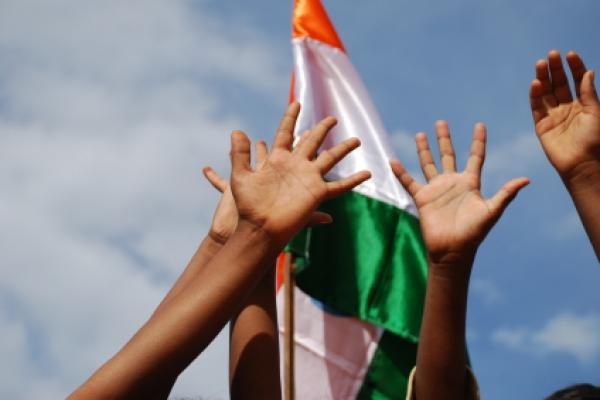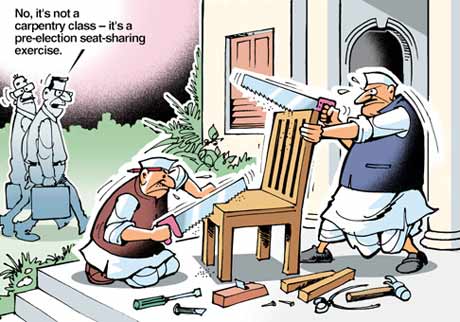Ahimsa — we are so used to it. The whole nation propagates it in the name of MK Gandhi. Every campaign or movement starts with it (be it Anna Hazare or Ramdev). Several times a question arises in my mind- Are we truly nonviolent? Do this Ahimsa has any real significance in life
We’ll, I’m bit doubtful. I don’t think we are non violent. Violence is in human blood, and we hold no distinction to that. We are using this non violence or Ahimsa propaganda just to hide our weaknesses. I’m not writing this in reference to MK Gandhi or Mahatma Buddha – the icons of Ahimsa. I’m just talking in the general scenario.
We propagate non violence, but from deep inside we know we are violent. We have resorted to nonviolence because either we have come used to it or we are lacking something. The big question is- is it the only means? Or is it effective? I remember the words of Sri Guru Gobind Singh Ji where he says – when all means of peaceful negotiation end up with no positive results, sword is your ultimate friends.
“When the affairs are past other remedies, It is justifiable to unsheath the sword.”
I’m not a supporter of violence but sometimes, under some circumstances it becomes necessary. But who justifies the circumstances. We don’t carry the intellects to differentiate the necessity of a situation. Take the recent case the mob violence against North East Indians in the southern parts. (I’m not referring to any religion here, because I personally believe no religion preaches what is happening). The NE Indians are in minority so they are getting attacked. And same case applies to North Eastern states as well.
Now coming to the political scene: We gather on Jantar Mantar or maybe some other stage for a peaceful protest against wrong policies. Police comes up, sometimes even we are asleep with their canes and beat the holy hell out of us. They aren’t non violent. Are they?
I go sometime back: there was a big fuss created in Maharashtra in the name of Marathi Manus. A well established political personality openly condemned the immigration of people of other parts of the same nation. He even provokes his party men to attack them and the result was seen with the loss of public property, shops being shattered, cabs broken and burnt and people beaten and stoned. A non bailable warrant is issued but no arrests took place. Was that Ahimsa. I know the localites had problems with uncontrolled immigration but that was a result of political failure of that state. Was that particular minister trying to convey that only a few local Indians have right on particular area of this nation while others doesn’t. He needs to learn we all are Indians and each and every Indian has equal right of this nation. But attacking immigrants aren’t the solution. Again another instance of our violent character.
There are hundreds of other instances and I won’t be mentioning all those here. Now moving to the main point:
As proposed by MK Gandhi if a person slaps you, bring affront the other side. To some extent I agree. May be assailant feels ashamed of his action. But what if he again slaps? And this happens several times. You certainly are left with no other option but become violent but on the defensive end.
As proposed by MK Gandhi if a person slaps you, bring affront the other side. To some extent I agree. May be assailant feels ashamed of his action. But what if he again slaps? And this happens several times. You certainly are left with no other option but become violent but on the defensive end.
Among the two conflicting thoughts of being violent or non Violent I would say there is a need of a midway. As stated by Guru Gobind Singh Ji- you start up with a humble interaction, try to influence, move on with an aggressive talk if the former fails and sword needs to be the last resort.
Many people would say I’m getting fanatic right now and just promoting an ill fated act of violence. I’m not. Above I mentioned some instances, here are a few more with violence on a positive note.
Take the example of French revolution where the tyrant monarchs were dragged in public and executed. That was the case where being non violent wasn’t holding any means. People were denied their basic rights and they finally have to resort to violent means to mend their corrupt system and build up a nation. Similar is the case with Libya . But we are living in a democratic society. Ruling party always propagates non violence. But that is not for them, but for common masses, because deep down inside they know the violent consequences of what they are doing to our nation. But we need to take a step ahead. If we do just even a fraction of what Libyans and French did, we will be able to restructure the internal systems of our nation. But I really doubt, if we will ever do that.
In the nutshell, being completely violent or non violent doesn’t do any good. But there is a need to alter strategies so that production goals are met. Violence may not help, but sometimes it is necessary.




